| |
The Dub Rifles
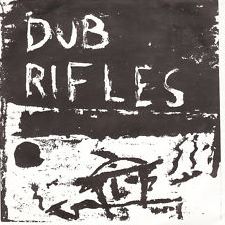
No Town, No Country EP - 7"
Notown - 1982
Michael Panontin
|
Colin Bryce recalls the early days of the Dub Rifles, Manitoba's most interesting band in the eighties, as equally a curse and a blessing.
"Living in Winnipeg is like living on an island. The long winter months and distance from anywhere else - especially back then - kinda prohibits travel," he explained to CM. "There were lots of rednecks, of course. And anything new was suspect and punk was as dirty a word as one could mutter."
But as anyone who has been there knows well, Winnipeg is also a city teeming with culture, from the Royal Winnipeg Ballet and the Museum of Human Rights to its once well-deserved reputation in the sixties as Canada's rock 'n' roll capital. And the Dub Rifles - they were singer/guitarist Bryce, with bassist Clint Bowman, saxophonists Dave Brown and Sid Challenger, and drummer Eloi Bertholet - were no exception.
For one thing, the various band members had connections to places all around the world: Bertholet had spent part of his childhood in Nepal and Bowman had studied in Nigeria and Britain, while the Brit-born Challenger had lived in Texas and Indiana before settling in Canada. And Bryce and Brown both had strong UK family connections. Add to that the fact that Bryce and Challenger shared a place above one of the city's reggae record shops (yes, there was more than one!) and the Dub Rifles' hybrid soul/punk/reggae sound becomes a little less surprising.
"We had varied and informed tastes, I think it is fair to say. Our soundtrack at the rehearsal space was usually a bunch of Motown, the Wailers' Lee Perry recordings, mod revival and punk things, James Brown, and post-punk/no wave things like the Pop Group, James Blood Ulmer, Contortions etc. So we hunkered down with our records and jammed."
And so, flush with enthusiasm, the Dub Rifles entered a local studio and took the plunge into DIY-land with their first record, the five-song No Town, No Country EP. A short-lived staple on the university radio circuit, the Notown EP, as it would become known, bashes the listener right from the get-go. The eponymous 'No Town, No Country' is a heady mash of punk and soul with a blistering dual sax assault, while the excellent 'Production of Funds', with Bowman's manic bassline and Bryce's sweaty vocal, works those early-eighties punk-funk grooves. But the highlight is over on the flip side in a song called 'Number One', so titled because "it was the first tune we wrote as the Dub Rifles, back in the earliest days". (It was also interestingly my own introduction to the band via a mix-tape sent to me by Porcelain Forehead singer Mike Hillis way back in the day.) 'Number One' is a full-on skankfest and likely one of the first second-wave ska tracks outside of Britain. I'm guessing it filled a dancefloor or three at the time.
A follow-up disc - the three-track Boom EP - also garnered its share of college airplay, but without the means to properly promote it, not to mention that Manitoba isolation, the Dub Rifles didn't stand a chance. There were sporadic gigs across Canada, a few stints in Toronto, where "we hung out and played on Queen a lot", and even a gig in Halifax that netted the group "some quality press due to our internal problems that ended up in an onstage fist fight and club damages."
But those who lived through it know that trying to succeed as an indie band in the conservative Reagan-era eighties was a task of Sisyphean proportions. Bands were usually left to their own devices, traversing the country in beat-up vans - or, as was the case with the Rifles, a small bus - sleeping on floors and playing for peanuts. "It's no wonder bands break up after a couple years," Bryce laments, "especially when you don't have any support from a management or label type." And so after a final performance at the venerable El Mocambo in Toronto in April of 1984, the Dub Rifles decided they had had enough and called it a day.
|
|
Suggestions
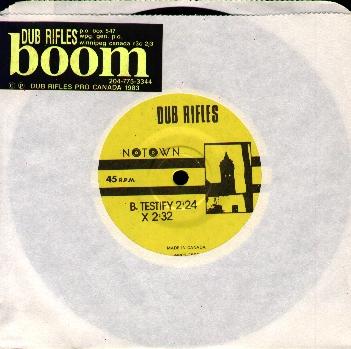
The Dub Rifles
The Boom EP - 7"
Notown
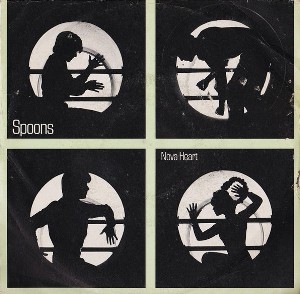
Spoons
Nova Heart / Symmetry - 7"
Ready
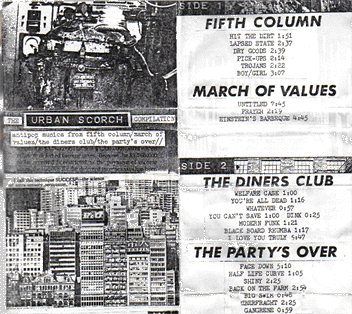
Urban Scorch Compilation
(various artists)
Some
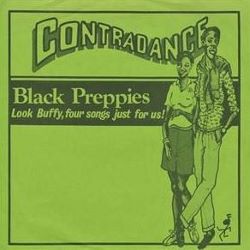
Contradance
Black Preppies EP - 7"
Dancing Note
|








